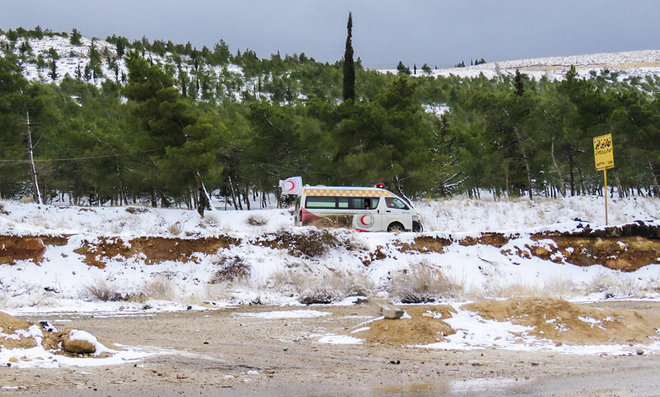A United Nations probe announced on Tuesday that the regime in Syria intentionally bombed the Ain al-Fijeh spring in December, leaving more than five million people in Damascus without access to water.
“The information examined by the Commission confirms that the bombing of (the Ain al-Fijeh) spring was carried out by the Syrian regime,” the UN Commission of Inquiry on Syria said in a report that branded the strike a “war crime.”
The report meanwhile dismissed regime allegations that rebels had contaminated the water.
Around 5.5 million people in Damascus and its suburbs were cut off from water when fighting intensified in Wadi Barada near Damascus in late December.
The regime accused the rebels of poisoning water resources and cutting off the mains, while the armed opposition said regime bombardment had destroyed the infrastructure.
The UN experts, who have never been granted access to Syria and who base their reports on interviews and documents, said they had found no “indications that the water was contaminated” before the spring was bombed on December 23.
“On the contrary, interviewees say that Wadi Barada residents used water up until the bombing of 23 December and no one experienced any symptoms of contamination,” the report said.
Following the bombing, the water was contaminated after shrapnel damaged fuel and chlorine storage facilities, it said. The bombing itself indicated that the “spring was purposely targeted,” the report found.
“While the presence of armed group fighters at (the Ain al-Fijeh) spring constituted a military target, … the damage caused … was grossly disproportionate to the military advantage anticipated or achieved,” it said.
“The attack amounts to the war crime of attacking objects indispensable for the survival of the civilian population, and further violated the principle of proportionality in attacks,” the report concluded.
At the end of January, Syria’s army regained control of Wadi Barada, which rebels first seized in 2012.
Earlier on Tuesday, the top UN human rights official called for tens of thousands of detainees to be released from Syria’s prisons and for torturers to be brought to court as part of a lasting peace.
Former Syrian detainees also testified before the UN Human Rights Council about their suffering and concern for men, women and children still in custody of the regime or of extremist groups including al-Nusra Front and ISIS.
“Today in a sense the entire country has become a torture-chamber; a place of savage horror and absolute injustice,” said UN High Commissioner for Human Rights Zeid Ra’ad al-Hussein.
“Ensuring accountability, establishing the truth and providing reparations must happen if the Syrian people are ever to find reconciliation and peace,” he told the Geneva forum.
Zeid urged the warring sides to halt torture and executions and to free detainees or at least provide basic information to their families.
The Syrian regime delegation did not attend but has denied allegations of systematic torture. The envoy from Russia, its main ally, called the event a “waste of valuable time”.
Noura Al-Ameer, a former detainee and activist, cited the case of Ranya, a woman detained in 2012 with six of her children and still missing.
“Many other women are detained with their children, detained in places not even fit for animals, let alone fit for children,” al-Ameer told the council.
Paulo Pinheiro, chairman of the UN Commission of Inquiry, noted that its 2014 report found that the scale of deaths in prisons indicated that the Assad regime was responsible for “extermination as a crime against humanity”.
Zeid and Pinheiro pledged support to a new UN mechanism which will collect evidence and prepare criminal files for prosecution by national authorities or an international court.
The regime detains 87 percent of those in custody, said Fadel Abdul Ghani, executive director of the Syrian Network for Human Rights.
“The regime is trumping everyone else with nearly 92,000 individuals that are still inside its detention centers,” said Abdul Ghani. Many suffer “horrendous acts of torture”, he said.
Mazen Darwish, a lawyer freed in 2015 after three years in jail, voiced outrage at the lack of international action.
“We are speaking of a daily massacre going on for six years. Why are we here? Today there are women, men, children, innocent people who are being killed under torture…It is strange that in front of all this evidence we do not see a real movement.”
